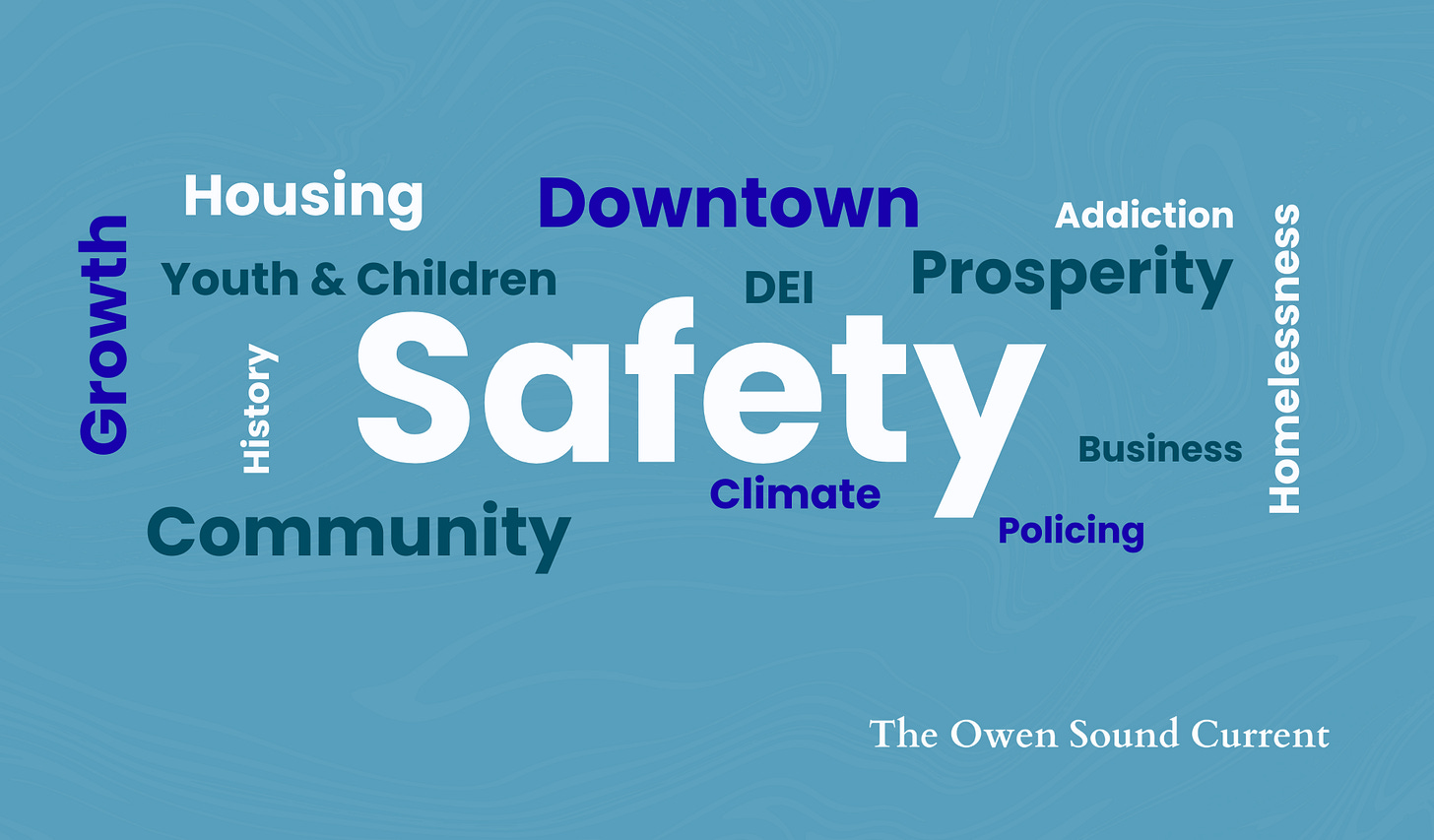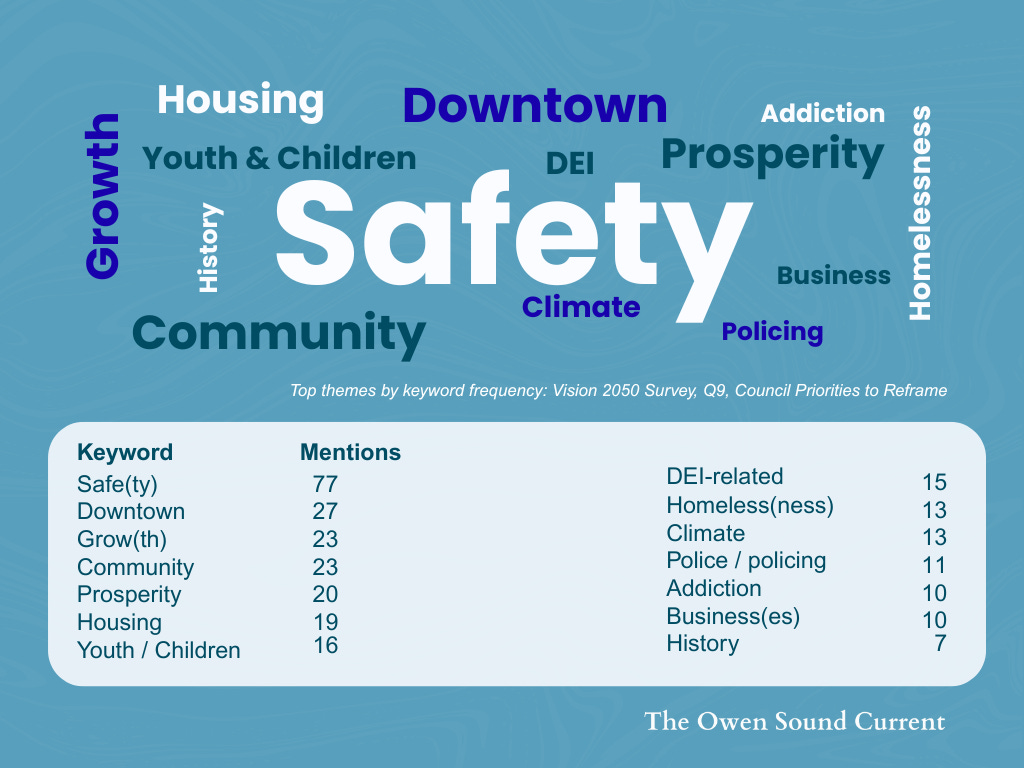Vision 2050 Report: What Residents Said About Council’s Priorities in Survey City Hall Didn’t Publish
Nearly 1,000 residents shared 5,000 comments in the Vision 2050 survey. The City shared only a summary. We paid for the full data under FOI so the community’s voice is part of the public record.
In spring 2024, the City of Owen Sound kicked off its most ambitious and costly strategic planning exercise to date. The project called Future Owen Sound: Vision 2050 promised to “create a roadmap for where the city wants to be” and is intended to drive Council’s priorities in each four-year term over the next two decades.
But what that vision entails — and who is responsible for determining what it is — has proven difficult to pin down.
As we reported in June, despite $200,000 in budget allocated to Vision 2050 over two years, it still hasn’t produced a strategic vision.
Staff’s initial implementation plan was sent back to the drawing board by the Strategic Planning Committee in June, with some members commenting that they had expected a greater role in setting the vision before the staff proceeded. (That plan is no longer available on the City’s website.)
And in that meeting, it became clear there was a lack of consensus among committee members and staff about what a strategic vision actually entails.
We attempted to explore the disconnect and project delays with a Freedom of Information request for all emailed communications between the City Council, staff, and their Vision 2050 consultant in the first half of this year.
The City of Owen Sound slapped our request with a $7,587.50 fee, claiming staff could not possibly produce the emails from this one project without a manual review of every City email sent and received across the organization over six months.
Our appeal to the City to waive that fee on the grounds that it was inequitable and unfair was denied.
And so, as Council resumes its business this evening for the fall session, the status of Vision 2050 remains unclear.
What we do know is this: nearly 1,000 people took the time to respond to the Vision 2050 survey last year, and their input matters.
The Vision 2050 Engagement Summary Report states that “The full results of the survey, including a breakdown of demographics, were included in the Future Owen Sound—Vision 2050 Survey Report, which was published in September 2024 and presented to the City’s Strategic Planning Ad Hoc Committee.”
In truth, the full results of the survey have never been released by the City of Owen Sound. The 5,000 qualitative responses recorded were summarized in two pages (11, 12) of the consultant’s aforementioned 2050 Survey Report.
The Owen Sound Current obtained the full qualitative survey results this year via a municipal freedom of information and access request, with a $517.50 processing fee paid to the City of Owen Sound.
Today, we’re releasing those results in full.
This strategic planning exercise and the associated survey have been undertaken at significant taxpayer expense, and we believe the full results — all data, as provided by community members — should be publicly available in perpetuity.
The full survey responses are available in this searchable Google Sheet. Readers can use the search or filter tools to quickly find comments by keyword — for example, typing “housing” will pull up all responses that mention it, while filtering by “safety” or “downtown” makes it easy to see recurring concerns.
The spreadsheet format also allows you to sort, copy, or analyze the data for your own research, reporting, or community discussions.
This data represents a public investment in our shared future. Future planning exercises of this scale must be conducted in the open if they are to serve the community effectively.
In the coming weeks, we’ll take a deeper look at your responses to each of the qualitative questions, beginning today with whether community members felt any of Council’s priorities needed to be “reframed or enhanced.”
Reframing City Council’s Priorities
The first open-ended question in the Vision 2050 survey asked:
Do any of the previous Council Priorities need to be reframed or enhanced?
(As a reminder, previous Council Priorities were: Safe City, Prosperous City, Green City, A City That Grows, A City That Moves, City Building, and Collaborative City.)
In response, 159 residents of Owen Sound said yes, offering detailed and often passionate feedback.
A Safe City: The Most Urgent Priority
The theme of safety emerged as the single most dominant concern across responses. Dozens of residents shared that they no longer feel safe downtown, citing visible drug use, discarded needles, petty crime, and a lack of effective enforcement. Some noted that they now avoid the downtown core altogether, especially with children or seniors.
Many called for increased police presence, the creation of a detox or treatment facility, and a more comprehensive, coordinated approach to mental health and addiction.
While a few respondents expressed concern about how terms like “safety” may be interpreted through a lens of social cohesion or diversity, most linked their concerns directly to street-level safety, housing insecurity, and addiction-related impacts.
Respondents also expressed frustration that the "Safe City" label appears more like a slogan than a measurable goal with actionable steps and visible progress.
Prosperous City: But for Whom?
Concerns about prosperity were closely tied to economic opportunity, downtown revitalization, and the affordability of basic necessities. Many respondents criticized the prevalence of low-wage, service-based employment in Owen Sound, calling for more diverse and better-paying jobs, including careers suited for post-secondary graduates or skilled trades workers.
The lack of affordable and supportive housing was also raised repeatedly as a barrier to both individual prosperity and downtown economic viability. Several respondents questioned how prosperity can be achieved or sustained when core needs—like housing, transit, and public safety—are not being met.
A number of participants called for a clearer definition of what prosperity means and who it is meant to benefit, urging Council to ensure that growth is equitable and inclusive.
Green City and Climate Readiness
The “Green City” priority received mixed but engaged responses. Several participants pushed for the City to go beyond token environmental measures and focus more seriously on climate adaptation, waste reduction, and sustainable infrastructure.
Specific suggestions included stormwater management, shade tree planting, naturalization of underused public spaces, and penalties for property owners who eliminate green spaces.
Others expressed skepticism about the City’s climate focus, seeing it as politically driven or a distraction from more pressing local issues. Still, most respondents who raised environmental concerns agreed that Owen Sound must be proactive in preparing for the real-world impacts of climate change.
City That Moves: Accessibility and Infrastructure
While less commonly mentioned, respondents who did address transportation emphasized the need for accessible, reliable public transit, and improved infrastructure for pedestrians and cyclists. Several residents also called for action on dangerous intersections, speeding, and a more modern, multi-modal transportation strategy.
Some asked why rideshare services like Uber are unavailable in Owen Sound, with complaints about long taxi wait times and affordability barriers to getting around the city.
City Building and Growth
Respondents expressed a desire for the City to focus on infill development, affordable housing, and mixed-use neighbourhoods that are walkable and livable. There was strong support for prioritizing housing as its own standalone goal, rather than wrapping it into Prosperous City or A City That Grows.
Others noted that heritage preservation, public amenities (like washrooms and community spaces), and investment in youth services and arts and culture should be part of any city-building strategy.
Collaborative City and Trust
“Collaboration” was viewed by many as a goal that currently exists more in principle than in practice. Several residents said they felt excluded from meaningful engagement and that the City often appears to make decisions in isolation.
Transparency, accountability, and follow-through were common asks, as was a call for annual progress updates tied to these priorities.
Some advocated for stronger partnerships with community groups, schools, and Indigenous organizations, noting that collaboration must go beyond token consultation and into shared problem-solving.
Key Takeaways
Residents are not rejecting the City’s existing priorities outright, but they are demanding clarity, urgency, and action.
Safety, housing, and economic well-being were the most consistent concerns, with many questioning whether current policies are improving conditions on the ground.
The message was clear: broad slogans are not enough. Residents want measurable goals, transparent reporting, and visible change.
You’ll find all responses to this question in full in Column A of Owen Sound Current’s copy of the Vision 2050 raw survey results, obtained from the City of Owen Sound via an information and access request under the Municipal Freedom of Information and Protection of Privacy Act (MFIPPA).
Related:







